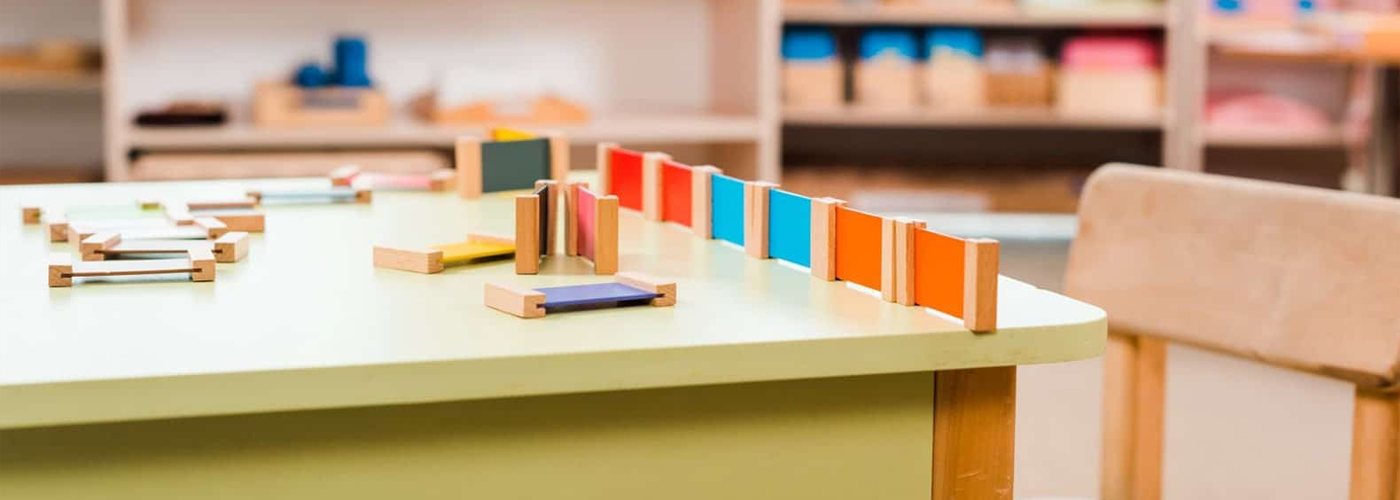Sensorial education is fundamental in Montessori pedagogy, since it is based on the natural interest of children at these ages in exploring and perceiving all the details surrounding them.
In this course you are going to learn about the materials that guide children in their process of organising information and promoting their cognitive development.
- 100% online training
- Without schedules, sign up and start now!
- Up to 30 days to complete the course
- IMI Certificate, accrediting 20 hours of training
MONTESSORI COURSES FOR THE STAGE OF 3 TO 6 YEARS
MONTESSORI COURSES FOR THE STAGE OF 3 TO 6 YEARS
Objectives
THEORY
PURPOSE
INFANT STAGE
MATERIALS
PREPARATION
MAIN ASPECTS
Information
- Teaching team with great knowledge and international experience in Montessori classrooms.
- Didactic material: in our virtual campus you will find theoretical and practical content and videos.
Sensorial education is one of the axes of the Montessori method, which takes advantage of children’s interest in exploration and the ease of perceiving details, between three and six years of age.
“The education of the senses should be begun methodically in infancy and should continue during the entire period of instruction which is to prepare the individual for life in society.”
Maria Montessori
Beyond stimulating the different sensorial channels, the materials designed by Dr Montessori offer the possibility of organising information and favouring cognitive development through classification and serialisation.
The characteristics of these materials that stand out are the self-correction and the introduction of the child to abstract concepts through concrete experiences.
The work in this area prepares children for further learning related to Mathematics and Geometry and develops some necessary skills for reading and writing, in the words of Dr Montessori:
“Sensorial development precedes that of a higher intellectual activity”.
The education of the senses in Montessori pedagogy
- The importance of sensorial education.
- The 3- to 6-year-old child characteristics and the sensorial material.
- The senses and the Mathematical Mind bases.
Sensorial material fundamentals.
- General purposes of the area.
- Characteristics of the materials.
- The Three Period Lesson.
- Work levels.
Groups of exercises
- Sense of sight.
- Discrimination of dimensions.
- Color discrimination.
- Discrimination of forms.
- Stereognostic sense.
- Sense of touch.
- Sense of hearing.
- Sense of taste.
- Sense of smell
Examples of representative materials for each group.
Contemporary experts in human development highlight the relationship between sensorial and cognitive development during the first years of life and validate Montessori’s approach on the importance of educating the senses.
This course is aimed at both families and education specialists, since it can be used in different areas, such as: in the family home, after-school centres, schools and nurseries, etc.
- Teachers
- Professionals interested in early childhood education.
- Homeschooler families (home schooling)
- Educators for toy libraries
- Educators of children with special educational needs
- Psychologists, Speech therapists, Pediatricians, Therapists, Neurologists
- Childhood educators
- Grandparents, families and any other professional profile interested in these stages of development
- Mothers and parents
- Other environments educational
- Any professional interested in educational innovation
After successfully completing the activities requested at the end of each module, the student will receive a Certificate in digital format, awarded by the International Montessori Institute as the official training center for Montessori pedagogy.
Registering for the course is very simple, you must click on the “Take this Course” button that you will find under the course title.
Once this is done, the shopping cart will appear with the course you have chosen, and you must click on “Proceed to checkout”, or continue browsing our website to add new courses to your cart.
The next step will be to fill in the form with the billing information and choose the payment method: by card or Paypal, and click on “Place order”.
After the registration process, you will automatically receive a welcome email, which will include your access codes so that you can start the course. Remember that you have up to 30 days to complete the course.
Remember that after reading or viewing the content of the lessons you must press the “Completed” button, and thus proceed to the next topic.





